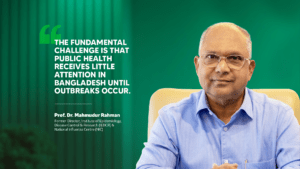1. Let’s start with your childhood memories and early life and how they have shaped your entrepreneurial mindset and leadership style.
My father was a huge inspiration for my entrepreneurial journey. In the ’80s, he founded one of the first private banks in the country—a groundbreaking concept at the time. As it succeeded, many people came to him for guidance, and witnessing him create jobs and opportunities inspired me deeply. My mother was also a source of motivation. She taught us to live a life of simplicity, instilled a deep-rooted consciousness in us, and emphasized the importance of a strong education.
Tragically, my father was assassinated when I was 16, an event that shook our family and made headlines nationwide. At that time, I completed my O-levels from Green Herald and later my A-levels at Scholastica. Afterward, we moved abroad, and I graduated from the University of Texas at Austin with a degree in Economics and Finance. I returned home immediately to join the family business.
From a young age, I was involved in our family business, and after my father’s passing, I took on greater responsibilities, including joining the UCB Board of Directors at an early stage. During each university break, I would return to Bangladesh to oversee business operations. My professors introduced me to international opportunities, and I proactively reached out to many potential customers in the U.S., arranging factory visits even while still at university.
I graduated in December 1998 and returned to Bangladesh. Following my father’s passing, we sold some of our other businesses, including a paper manufacturing plant and a toy factory, to focus on the garment sector, beginning with a factory of 1,200 employees. I took charge and expanded operations, setting it up for growth by buying a distressed factory in Gazipur, bringing in professional management, and establishing a corporate structure with a dedicated CEO. We later acquired another factory in the Adamjee Export Processing Zone (EPZ).
As young leaders, we faced tough negotiations and high-stakes decisions, but ultimately, we turned each factory around.



2. You’ve played a key role in expanding Ananta Group into a highly diversified conglomerate. Can you tell us more about the different sectors Ananta Group is involved in and the vision behind your approach to diversification?
Expanding Ananta Group has been about strategically diversifying into sectors aligned with a vision of long-term value and sustainable growth. We started with a strong foundation in the garment industry, where we built partnerships and joint ventures that fueled our success. For instance, our suit factory, Universal Menswear, was launched with a strategic five-year commitment from H&M, enabling us to create a unique, high-quality product line. Today, we’re proud to be the largest formal wear supplier in Southeast Asia, running successfully for over 16 years. We also partnered with Martin Trust, an industry pioneer, to establish a high-end sweater factory through a joint venture with a Chinese partner, further strengthening our portfolio.
In the garment sector, we operate four denim factories, a sweater factory, and our first knitwear facility in the Chittagong EPZ focused on lingerie and activewear. We employ 32,000 people and generate nearly $450 million in exports. We’ve invested heavily in infrastructure, compliance, and environmental standards, and developed an organizational structure that allows for organic growth and sustainable scaling.
Beyond garments, we’ve ventured into real estate with unique, community-focused projects. Our flagship development in Baridhara East spans 45 bighas, integrating extensive green spaces, a jogging track, tennis courts, and water features, providing residents with a high-quality, eco-friendly lifestyle. This project will be the first LEED Platinum Homes in Dhaka. We’ve also been investing in retail to retain local spending, with upcoming projects that include a 300-room hotel and a Grade A office tower to meet the needs of multinational clients seeking premium office spaces.
In 2016, we began innovating in the IT space by launching Sindabad.com, Bangladesh’s first B2B platform aimed at supporting SMEs and retail stores by managing supply chains.
I’m now also serving as Chairman of UCB, where my goal is to establish solid governance rooted in transparency, integrity, and sustainable growth. We are fostering a unified vision for the bank and have set a mission to make UCB the country’s leading bank by ensuring integrity-driven operations and empowering our employees.
Our journey with Ananta Group is driven by a passion to create diverse, high-value enterprises that contribute to Bangladesh’s economic growth and elevate industry standards across all our ventures.

3. Under your leadership, Ananta Group has experienced significant growth and diversification across multiple sectors. What have been the main challenges in managing such a large and diverse enterprise, and how have you successfully overcome them?
When we first started, everything was a challenge—coordinating air shipments, managing late freight deliveries, and navigating logistics felt like an uphill battle. Over time, I realized that self-discipline and structure are the keys to managing these complexities. I work out 5–6 days a week, and this discipline keeps me energized and focused, fueling my excitement for work.
In terms of work style, I prefer a flat hierarchy based on common-sense logic. While I maintain an open-door policy, I emphasize that each person respects their hierarchy within the company. This balance encourages openness while ensuring that processes are respected. Achieving this level of maturity wasn’t easy, especially in my 20s when I was leading people much older than me. In banking, managing people with patience and respect has been crucial for long-term success.
Balancing work, family, and personal well-being is essential. I believe maintaining self-discipline in each of these areas positively impacts everything else.

4. As the new Chairman of United Commercial Bank, what are your key priorities for the bank in the coming years? How do you plan to leverage your experience from Ananta Group to drive success in the banking sector?
I have ambitious plans for UCB. Our first priority is building a strong management team. We’ve appointed a highly qualified MD who aligns with our vision, and we’re carefully monitoring key roles. UCB’s reputation has grown to the point where professionals from other banks are eager to join, driven by our commitment to effective management.
Second, we’re dedicated to transparency and accountability. We’re addressing past issues by conducting forensic audits, and with support from the Bangladesh Bank governor, this audit will soon conclude. Our corporate loan portfolio currently stands at 70%, but over the next six years, we aim to reduce this to 50%, focusing on expanding the SME and retail sectors, primarily through digital channels and B2B solutions that support SME growth.
In retail, we’re strong in deposits, and there’s great potential in products like brokerage and asset management. Bangladesh’s rising income levels open opportunities for white goods financing, personal loans, and more. We’re investing heavily in core banking infrastructure and scaling our digital banking services, supported by our MFS license for Upay.
Our vision for UCB is to establish it as a blue-chip bank, engaging with top-tier corporations for sustainable growth. Through strategic planning and digitization, we’re building a future-ready bank.



5. The banking sector in Bangladesh has faced its fair share of challenges in recent years, from nonperforming loans to regulatory changes. What, in your view, are the most critical improvements needed in the banking sector, and how can UCB contribute to a more robust and transparent financial ecosystem?
In the banking sector, implementing laws is more crucial than merely reforming policies. Over the past 16 years, systemic failures have been exacerbated by leniency and lack of enforcement—a cycle resembling a pyramid scheme. It’s disheartening to see governance, the central bank, and the financial system falter in unison. Proper enforcement of loan default laws and strict adherence to regulations are essential. Accountability is key to creating a lasting impact.
Minimum provision levels (MPL) have both pros and cons. If capital shortfalls and other deficits aren’t addressed, it will erode depositor confidence and international trust. To restore stability, we need decisive action toward transparency, under strict regulatory guidance and a clear roadmap forward.

6. Could you share the key strategies and principles you prioritize in effectively managing a family business? Additionally, what insights and advice would you offer to individuals who aspire to build and sustain a lasting legacy within their own family enterprises?
In family businesses, relationships are paramount—whether among siblings, parents, or extended family. Respect is essential, even when boundaries are set between family and business. While we often discuss work around the lunch table, keeping respect at the core of these interactions sustains a healthy business environment.
Hard work is essential, especially in Bangladesh, where the younger generation sometimes struggles with maintaining focus. Specialization takes time—success doesn’t come overnight but after years of dedicated effort and careful planning. In family businesses, it’s important to create a path for growth, providing younger members opportunities to develop and eventually lead. For example, my son, now 18, will have the choice to join and expand the business or pursue other ventures. To give him that freedom and support is my measure of success.

7. What advice would you give to the younger generation aspiring to make an impact in Bangladesh, whether in business, technology, or other sectors? How can they best prepare themselves for the future?
Currently, we employ 32,000 people in the garment sector, which is a major driver of Bangladesh’s economy, contributing 80% of the country’s exports. We are proud to play such a significant role in this sector. At the same time, I have a strong interest in banking, which I see as a sector ripe for innovation and meaningful contributions to society. We are expanding with the goal of providing financial products and services that empower the next generation of businesses. Our mission is to make a positive and transparent contribution, as true success is reflected in how stakeholders view you, especially in the unique context of Bangladesh.
Our commitment is to uphold transparency and integrity in everything we do. While we are not politically involved, we are deeply invested in reform efforts that drive positive change in the country. The younger generation’s determination has set a powerful example by standing up against injustice and demonstrating resilience. Their courage inspires us, and we are optimistic about the future. Reforms are essential, and we aim to honor this legacy by focusing on progress and building a better Bangladesh.



8. How has your involvement with EO Bangladesh impacted your perspective on entrepreneurship, and what benefits do you see for entrepreneurs in being part of such a community?
Joining EO has primarily been about connecting with a community of like-minded individuals who share my values and philosophy. The camaraderie and mutual growth are truly inspiring, and I am excited about contributing to this community. Personally, I have gained a great deal from the forum, particularly through boardroom sessions and training, which I thoroughly enjoy.
Looking ahead, I would love to help EO reach even more young, aspiring entrepreneurs. By sponsoring initiatives to support them, we can broaden our impact and help them grow. It is rewarding to learn from fellow industry leaders here, and I am committed to giving back to foster the next generation of entrepreneurs.

9. Looking ahead, what is your vision for the future of EO Bangladesh, and how can the association impact the entrepreneurial landscape of Bangladesh?
We are in a unique position, especially in the banking sector, where we are embracing Professor Dr. Yunus’s “three zeros” philosophy. In collaboration with Grameen Trust, we are promoting bank deposit and credit products aimed at achieving “zero unemployment.” There is much to accomplish in this area, particularly by providing small and SME loans to support emerging entrepreneurs.
EO also plays a significant role in this vision by focusing on training, encouragement, and sharing success stories of entrepreneurs, which serve as powerful sources of inspiration. This, I believe, is EO’s true contribution: empowering others by example and nurturing a culture of possibility and growth.






